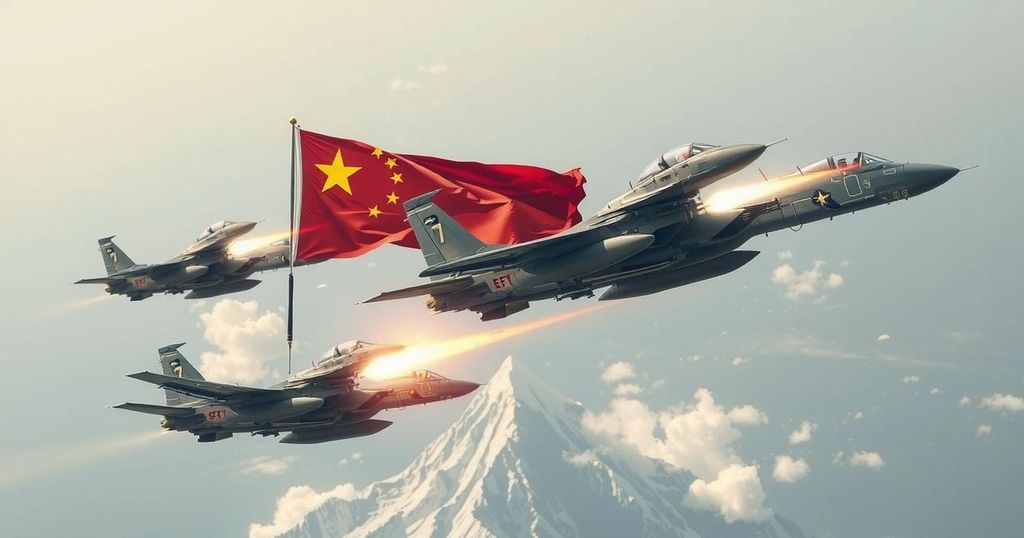China’s Military Escalation Ahead of Trump’s Return to Office

China has escalated its military and hybrid warfare activities, particularly in response to Trump’s anticipated return to the White House. Key actions include large-scale naval exercises around Taiwan, the unveiling of advanced military technologies, and significant cyber intrusions targeting U.S. institutions, all of which present a strategic challenge for the incoming U.S. administration.
In recent months, China has intensified its military displays and hybrid warfare tactics, particularly as the United States prepares for Donald Trump’s anticipated return to the presidency. These actions elucidate China’s strategic ambitions and the challenges it poses, with a clear emphasis on military readiness and capabilities. Since the 2024 presidential elections in the U.S., China has demonstrated both overt and covert maneuvers aimed at exerting influence, including an expansive exhibition of naval and air assets near Taiwan and Japan.
Significantly, China’s military exercises included the deployment of approximately ninety naval and coast guard vessels around Taiwan, simulating a naval blockade for the first time, which sent shockwaves through regional security dynamics. This escalation aligns with Taiwanese President Lai Ching-te’s diplomatic outreach in the Pacific and occurs amid ongoing tensions with the U.S. Such military exercises represent a historical precedent reminiscent of actions witnessed during the Taiwan Strait Crisis of 1996.
China’s unveiling of new military capabilities has further compounded concerns for the U.S. mainland. At the Zhuhai Airshow, China introduced advanced aircraft, including the J-35A, a fifth-generation stealth fighter touted for its remarkable capabilities. Simultaneously, developments regarding the construction of next-generation stealth bombers and the launch of the CNS Sichuan, the largest amphibious assault vessel, demonstrate China’s unwavering commitment to enhancing its naval prowess.
In conjunction with these military maneuvers, Chinese cyber activities have drawn significant scrutiny. Reports have emerged implicating Chinese hackers in breaches of major government sectors, including the Treasury Department and telecommunications firms, raising alarms about potential risks to national security and privacy. Deputy National Security Adviser Anne Neuberger indicated that the compromised data might affect millions of Americans, highlighting the pervasive nature of these cyber threats.
Furthermore, the adaptive strategies employed by China, alongside cooperative efforts with other nations perceived as adversaries of the U.S., signify an increasingly complex geopolitical landscape. This coalition, encompassing nations such as Russia and Iran, reinforces the need for a strategic reassessment of U.S. foreign policy in a rapidly evolving security environment.
Ultimately, the combination of heightened military displays, advancements in capabilities, and cyber operations outlines a multi-dimensional challenge for the incoming Trump administration. As the U.S. navigates these intricate dynamics, a cohesive and informed approach will be essential in safeguarding national interests and promoting stability in the Indo-Pacific region.
The backdrop of this discussion revolves around the increasing assertiveness of China in military and cyber domains, particularly in light of the changing political landscape in the United States. With Donald Trump’s potential return to the White House, China’s recent military activities signify an intention to recalibrate its strategic posture vis-à-vis American policies. The context of the 2024 U.S. presidential elections has rendered these developments noteworthy not only for their immediate implications but also for the potential shifts in international relations and alliances that may follow.
In summary, China’s recent military and cyber activities reflect a proactive strategy aimed at asserting its influence and testing U.S. responses ahead of a possible shift in presidential leadership. The showcase of military capabilities through large-scale naval exercises, advancements in stealth technology, and increased cyber incursions signals a multifaceted challenge for the United States. As the Trump administration prepares to assume office, it is imperative to recognize and address the complexities introduced by China’s aggressive maneuvers in both military and cyber realms.
Original Source: www.businessinsider.com








